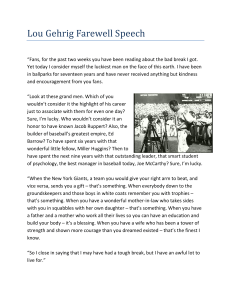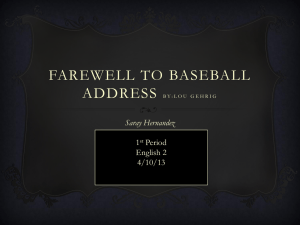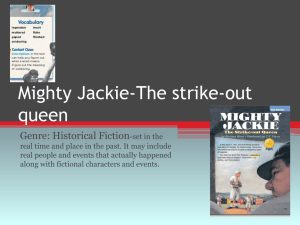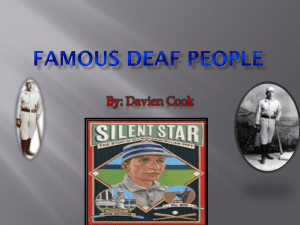Speech Analysis Lou Gehrig`s farewell
advertisement
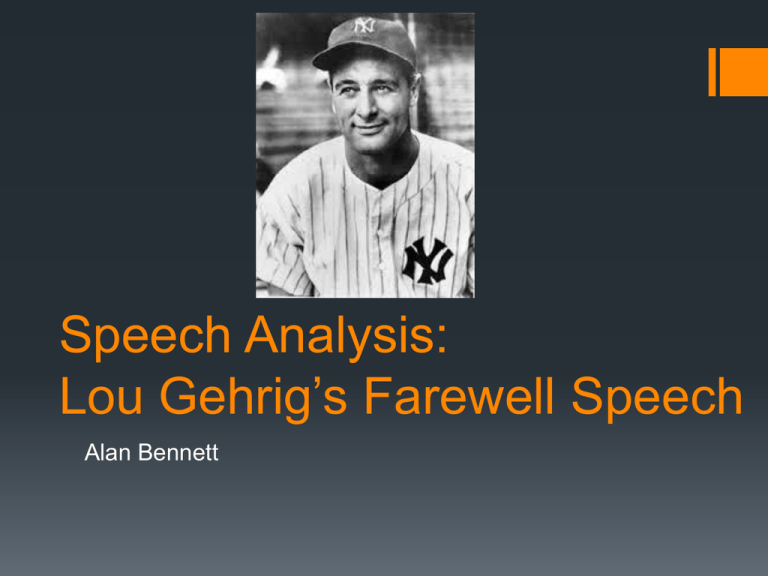
Speech Analysis: Lou Gehrig’s Farewell Speech Alan Bennett Background Lou Gehrig was born June 19, 1903 in New York City As a kid, his 2 sisters both died along with a brother who was still an infant. His family moved around a lot in New York. He went to college at Columbia University on a football scholarship but was later banned from college sports for his freshman year because he had played on a professional baseball team during the summer. After freshman year, he was able to play football and baseball for Columbia. He joined the Yankees in 1923 and had an amazing baseball career. Speech http://www.youtube.com/watch?v=NEMR411rZGk Me Giving the Speech Subject The subject of this speech was about Lou saying goodbye to the game of baseball due to his disease. He was letting the fans, players, and coaches know how much he appreciated them. He also looked back at what he had done in his career and how fortunate he was to be where he was. “So, I close in saying that I might have been given a bad break, but I've got an awful lot to live for.“ “Who wouldn’t consider it an honor to have known Jacob Ruppert?” Occasion The occasion of this speech is Lou Gehrig’s retirement. He was known nation and maybe even world wide as a great player and person. The fan’s loved him and hated to see him go the way he had to. This occasion was very important to all of baseball because it was the end of one of the greatest players of all time. Audience The audience of his speech were of course his fans. They were there from the beginning cheering him on the whole way. His audience was also the players and coaches around the league. He was sending a message not to take things for granted and to be thankful for how far they have come. “never received anything but kindness and encouragement from you fans.” “Also, the builder of baseball’s greatest empire, Ed Barrow?” Purpose The purpose of this speech was to say his final goodbye to a big part of his life. He had been on a baseball field for most of his life. He was also letting everyone know how grateful he was for his situation and how great his baseball career had been. “I have been in ballparks for seventeen years” “Look at these grand men, which of you wouldn’t consider it the highlight of his career just to associate with them for even one day?” Speaker The speaker of this speech is Henry Louis Gehrig, better known as Lou Gehrig. He was an amazing athlete that had a great baseball career. He was diagnosed with Lateral Sclerosis, now known as Lou Gehrig’s disease. “Sure I’m lucky.” “I close in saying” Tone I think the overall tone of his speech is thankfulness. Although he was seriously ill, he was still thankful for all that he had accomplished in his life. I think the tone was also sad because it was the end of something great. He was being forced to quit something he loved to do. “I've got an awful lot to live for.“ "Fans, for the past two weeks you have been reading about a bad break I got.” Analysis “Who wouldn’t consider it an honor to have known Jacob Ruppert? Also, the builder of baseball’s greatest empire, Ed Barrow? To have spent six years with that wonderful little fellow, Miller Huggins? Then to have spent the next nine years with that outstanding leader, that smart student of psychology, the best manager in baseball today, Joe McCarthy?” He is basically saying that he is very appreciative for all that has happened to him during his career. This is also where I thought he was conveying his message to the other coaches and players about being thankful. “I have been in ballparks for seventeen years and have never received anything but kindness and encouragement from you fans. Look at these grand men. Which of you wouldn’t consider it the highlight of his career just to associate with them for even one day?” In this part, he is thanking his fans for their support and once again expressing how grateful he was. Main Theme I know I’ve said this throughout the presentation, but the main theme is to be thankful for what you have. In his mind, he had nothing to be mad about because his life had been so great. He had done what he wanted to do because of his hard work, and because of the way other people had helped him. “I've got an awful lot to live for.“ “Which of you wouldn’t consider it the highlight of his career just to associate with them for even one day?” Ethos “When the New York Giants, a team you would give your right arm to beat, and vice versa, sends you a gift - that’s something.” I think this is an example of ethos because most people wouldn’t know that the Giants sent him a gift. No one has to believe that he got a gift from the Giants, but they do because of who he is. Pathos “So, I close in saying that I might have been given a bad break, but I've got an awful lot to live for.“ I think this is an example of pathos because people will feel different emotions from this quote. They will feel sad for him because he has a bad disease and because he is having to quit something he loves. Some people might also feel happy for him because even though he is suffering, he isn’t down on himself. He is happy with his career and is moving on with his life. Logos “Which of you wouldn’t consider it the highlight of his career just to associate with them for even one day?” I think this is an example of logos because he is asking a question that most everyone would have the same answer to, which makes it common sense. Rhetorical Devices: Rhetorical Questions “Who wouldn’t consider it an honor to have known Jacob Ruppert? Also, the builder of baseball’s greatest empire, Ed Barrow? To have spent six years with that wonderful little fellow, Miller Huggins? Then to have spent the next nine years with that outstanding leader, that smart student of psychology, the best manager in baseball today, Joe McCarthy?” This section of the speech is nothing but rhetorical questions. I think it makes the reader think about all the famous people that he dealt with on a daily basis and really emphasized how grateful he was to have had that experience. Restatement “Who wouldn’t consider it an honor to have known Jacob Ruppert? Also, the builder of baseball’s greatest empire, Ed Barrow? To have spent six years with that wonderful little fellow, Miller Huggins? Then to have spent the next nine years with that outstanding leader, that smart student of psychology, the best manager in baseball today, Joe McCarthy?” “Yet today I consider myself the luckiest man on the face of the earth.” “I've got an awful lot to live for.“ In all three of these examples, he is expressing his thankfulness but he is doing it in different ways. He did it with rhetorical questions, and by saying it directly. Powerful lines “Yet today I consider myself the luckiest man on the face of the earth.” “So, I close in saying that I might have been given a bad break, but I've got an awful lot to live for.“ “I have been in ballparks for seventeen years and have never received anything but kindness and encouragement from you fans.” All of these sentences are powerful because they all express his main idea directly. Literary Devices “Yet today I consider myself the luckiest man on the face of the earth.” This is an example of hyperbole because he thinks he is lucky but exaggerates it by saying he is the luckiest man on Earth. This sentence also contains irony. He is suffering from this terminal disease but at the same time considers himself lucky which is ironic. To Follow After his retirement, he was elected the NYC Parole Commissioner for a 10 year term and was sworn in in 1940. He rejected other job offers like guest speaking and other appearances because he wanted to serve his community. He died 2 years after his retirement on June 2, 1941. Questions?
